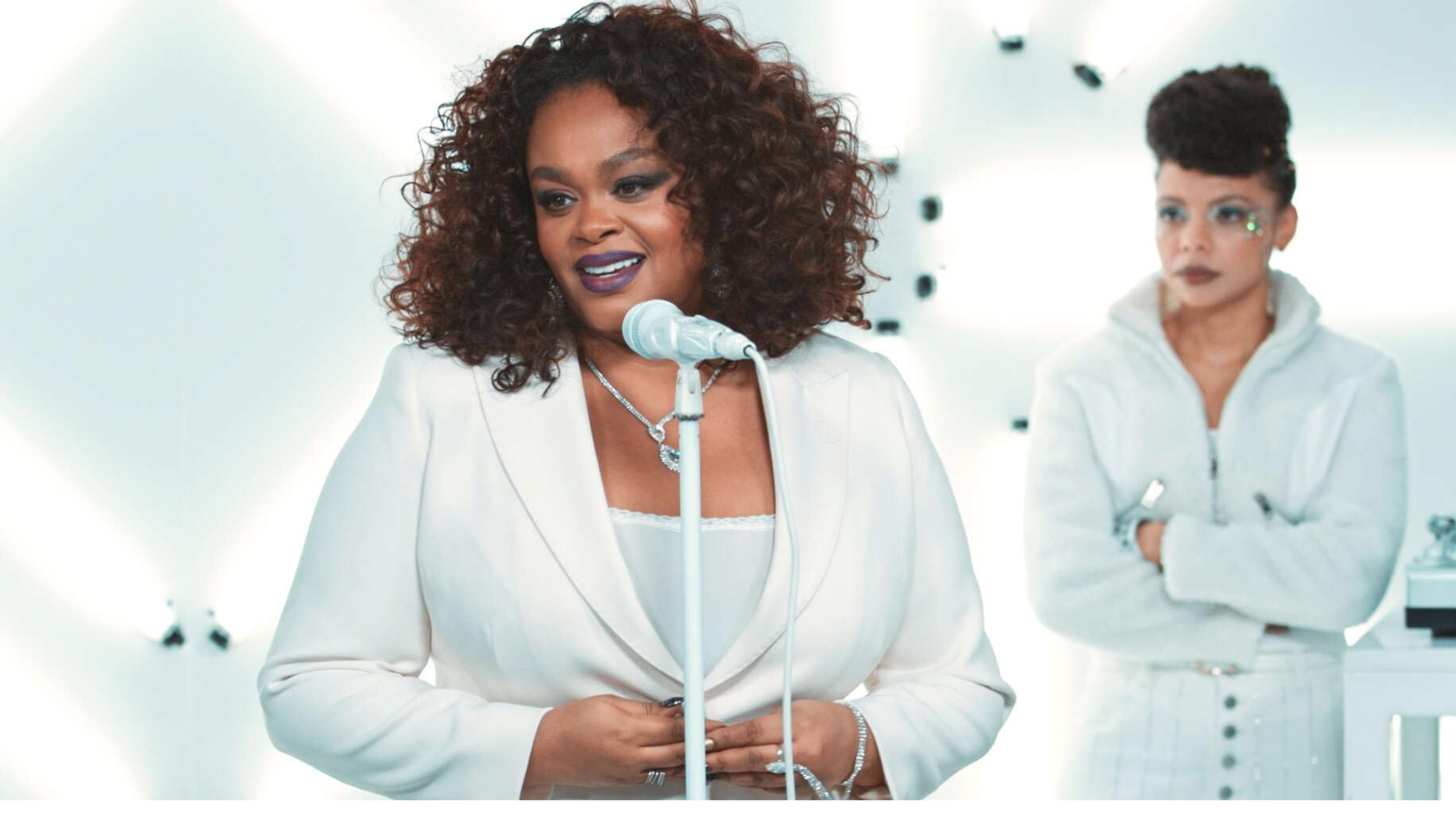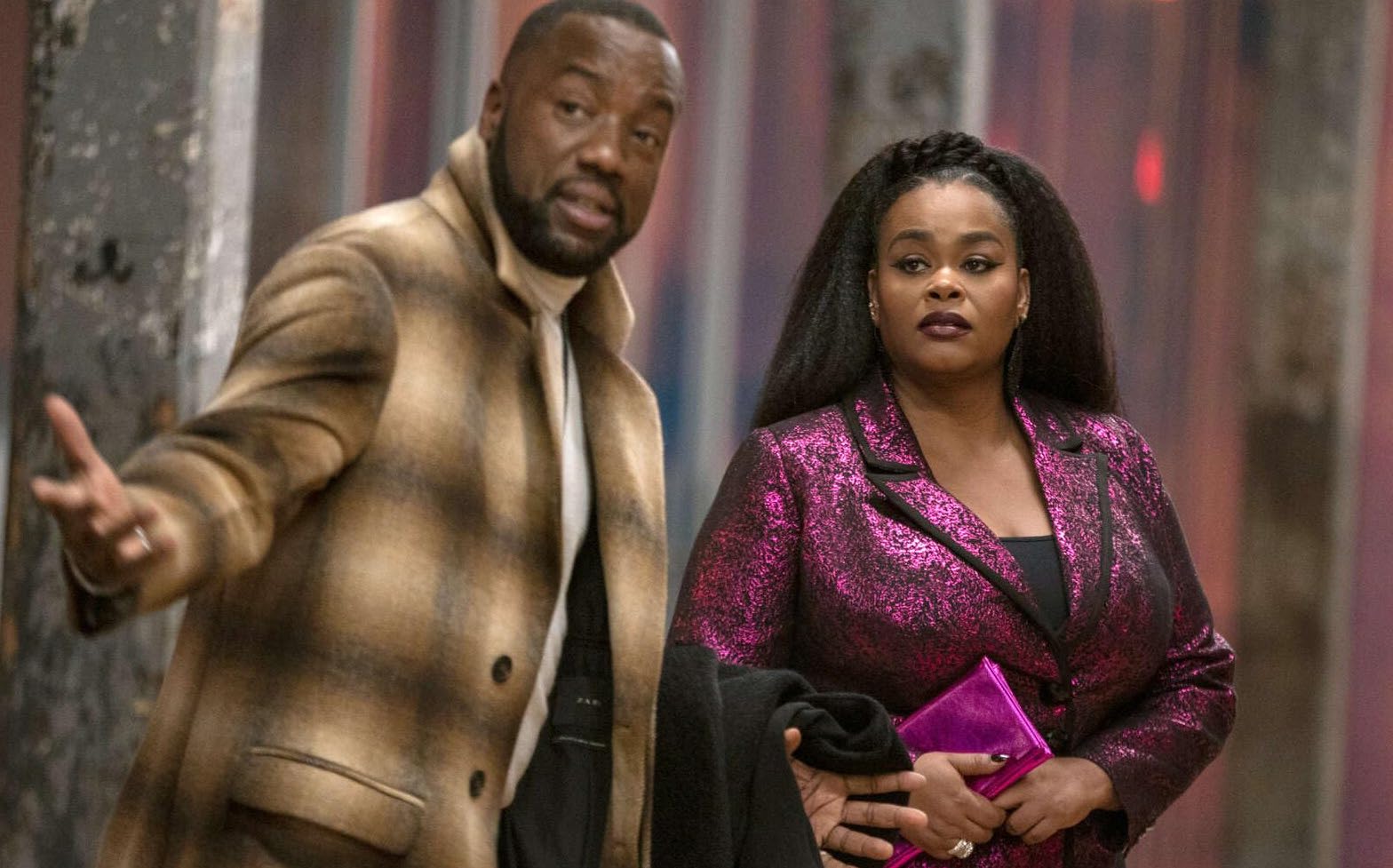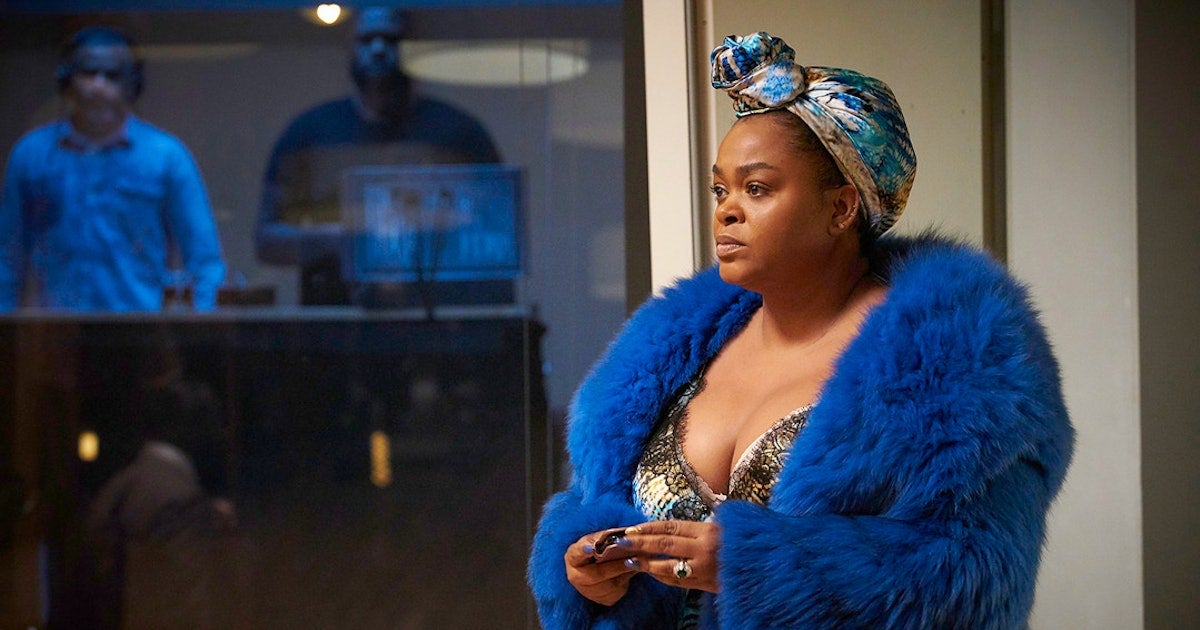
“When I started, I had to rely on a lot of men in the industry,” Hazel Rachelle says in front of a crowd of her closest friends and collaborators, in an episode of BET+’s First Wives Club. “Men who tried to mold me into something else because they thought that who I was, wasn’t enough. After a while, I started believing that myself. But with the help of my true friends, I realized I was more than enough.”
Hazel (played by Jill Scott) makes this bold declaration as she steps into a self-assured chapter of her life. This scene comes after she realizes she no longer needs her partner Derek (Malik Yoba). Throughout the first season, Hazel has been emotionally manipulated and drained, but she’s also leaned on her closest friends Bree (Michelle Buteau) and Ari (Ryan Michelle Bathe). This scene is pivotal to the show’s ongoing theme of friendship, and it’s also a major style moment; in it, Scott’s Hazel is wearing an all-white suit. The white hue signals the new chapter she’s walking into. It also draws attention to her stepping into her power as a woman in a male-dominated industry. She is doing so while continuing to dream rather than give up.

The previously described scene clarifies that in the universe that makes up Tracy Oliver’s First Wives Club, Hazel is one of the brightest planets. Her eagerness to be seen and heard is an ongoing theme in season one. By the end of the ten episodes, she is creating her life on her own terms. The BET+ series which aired in 2019 centers around a core set of Black friends who are dealing with relationship issues with their husbands. Alongside this ongoing theme, the costuming in the first season spearheaded by Dierdra Govan is exceptional and spot-on. Hazel’s looks are impressive mainly because they’re lived-in and not forced. No matter the occasion, she is either wearing a patterned suit, a form-fitting gown, or even a no-fuss top with denim.
Inspired by the lack of quality clothing she feels is available to curvy women, Govan alters nearly all of the pieces Scott was seen in for season one. In a Madame Noire interview, Govan shared: “I’m a constant sponge. But my biggest inspiration is not on the runways, it’s in the everyday, it’s on the streets.” Combining this notion with her past work on “Sorry to Bother You” and other films, Govan styled not just Scott, but her co-stars Buteau and Bathe. The costume designer expressed that when she set out to design the show she was focusing on nailing Scott and Buteau’s characters. “They were women of a certain age, they were sexy, they were full-figured, they were desirable,” she noted. “I didn’t want their size to be the focus. I wanted the fact that these women were dressing as women and were stylishly fabulous.”

The defining style chartered by Govan in the first season hooked me in. Scott’s costumes were also pivotal in exemplifying her bold, loud-mouthed personality. She was the friend that would never go down without a fight. That meant that she was often depicted in vibrant patterns, colors, and prints. Bree’s style is more toned-down, she wears denim quite a bit–Ari is often depicted in suits speaking to her life as a high-powered lawyer. Since Scott’s character Hazel is a beloved celebrity and entertainer, she never appears to cobble together outfits–there were one or two moments when she was a bedridden homebody. But those moments didn’t last long.
By the time season two debuts, costuming is being helmed by Lorraine Coppin. Scott’s Hazel is now the owner and founder of a record label, Ladies First, too. This new title epitomizes what she continues leaning into: her inner strength and her fascination with looking good. At the beginning of the season, she introduces her friends to her new beau Nigel (Mikhail Keize) while wearing a glitzy two-piece set. It’s a bit of a departure from her past looks, but it works, and it’s captivating. By mid-season, she’s wearing a camouflage jacket and a matching pair of bottoms; it’s clear she’s aiming to step into her leadership characteristics. At this point of the show, Hazel is constantly at odds with the caftan-wearing, free-spirited singer Regina (played by Deborah Cox). Since Hazel’s home is often her office she teeters between comfortable yet stylish looks. She adorns herself in overcoats; sometimes, they’re emblazoned with glitter, but they don’t feel childish–instead, they appear as markers of her exploratory style.
A pivotal moment in season two ensued when Nigel invited Hazel, Bree, and Jayla (Michelle Mitchenor) to a bashment in Brooklyn. The three friends arrived in club attire, Hazel was of course the dressiest of the friend group: she donned a golden bodysuit. Bree opted for a red cape blazer dress, and Jayla arrived in a maroon faux fur vest and matching dress. Everyone else who attended wore comfortable dancing clothes: colorful crop tops, shorts, and not much else. This distinct difference in clothing showcases not just a moment to reflect on differences in socioeconomic statuses, but also what Hazel felt would impress Nigel’s family. Though she still ended up clashing with her beau’s sister she was overly cautious of how her personality came across. This environment tested her, but she still came out triumphant.
Further emphasis was placed on Nigel and Hazel’s relationship when the duo nearly broke up–but by season three they’re going strong and set to wed–notably Derron Cherry stepped in as the lead costumer. In the first two episodes of this season, we catch a glimpse of her stunning wedding gown. It features a striking bustier accentuated with gold and off-white tones, and the train isn’t too lengthy. Nothing about her wedding day went well, and perhaps that was why aesthetically she and her bridesmaids, who were dressed in regal purple gowns, looked perfect. This twist was a bit confusing, but it’s proof of how spot-on costuming can trick you into thinking everything is fine. The couple ended up breaking things off and deciding to part ways.
For the rest of season three, Scott’s Hazel is thriving while fighting the powers that be as the founder of her label. Her clothing is still color-filled and she still heavily leans on patterns. In episode three which is marked by Ari’s funeral, she dons a head-turning, black and white patterned suit. A voluptuous feathered hat accompanies her look. While this felt like a bit of a miss, it also showcases the lengths Hazel goes to, to set herself apart from her close friends, even while mourning. Cherry excelled at nailing this notion. The other castmates are wearing black just as nearly everyone in this episode is.
A look that encapsulates the wonder of First Wives Club’s costuming is the gold number Hazel wears in the final episode of the series. It’s form-fitting, sexy and appealing. It’s a profound moment she takes, in a room with the main characters, including Khalil (Tobias Truvillion) who she is now publicly dating. She’s confidently smiling and champagne is flowing in the room. Regina is even there. Nothing about this moment is boring, it almost urges viewers to want to be a fly on the wall in the room. When I saw Hazel unable to experience her Grammy Award-winning moment, I was hoping Cherry would still give her a celebratory look, and she did. No matter if Scott’s Hazel was overly mouthy to some viewers, one thing that you couldn’t ever say is that she was unstylish. Each costumer succeeded in providing incredible looks for a curvy woman who has been a fixture in music for over 30 years. And that is perhaps what is most enjoyable about the clothing Jill Scott wears in First Wives Club.